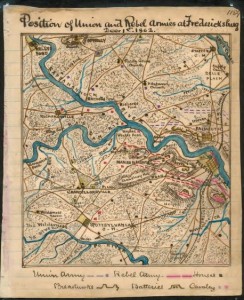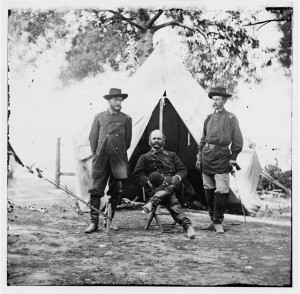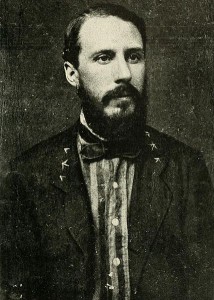From the Richmond Daily Dispatch December 3, 1862:
From Fredericksburg.
[Correspondence of the Richmond Dispatch.]
Camp near Fredericksburg, Nov. 29.
We came here last Saturday, and the indications were that we would have a fight next day. Reveille was ordered at 4½ o’clock and break fast at daybreak, horses to be hitched, and everything in the battery ready for action. As the gray dawn broke in the clear eastern sky, we listened to hear the whizzing of the first great shell, which we were to consider notice to mount and take our guns rapidly to our destined position in the line of battle. Presently the sun came up, and soon the anticipations of a fight passed away. Day after day the story is repeated, but each time attracts less attention.
I have been down several times to view the Abolitionisms [Abolitionists] on the other side. From the hills on this side we have a fine view. It is true that these hills are much farther from the river than those on the Stafford side, but they are nevertheless commanding and nearly as high. Between our range and the river there are beautiful flats, of from three quarters to a mile and a quarter wide. At the foot of this range of broken hills runs a canal, which would greatly obstruct the passage of infantry as well as artillery. If the fight comes off here I would advise you to come up and wintriness [witness] the grand and sublime special. There is a position commanding a full view of almost the entire line of battle. An artillery duel might be carried on here for a fortnight without any definite result. What we want to see is the infantry cross the river. We expect a most lively time then. The last battle of Manassas has been called the “most beautiful fight of the war, but a fight here will be more beautiful still, in my judgment, as well by reason of the result as the position of the parties. There is a ford on the left, near Falmouth, where infantry might cross, but the banks are so steep on the other side that artillery cannot be brought over.
Yesterday I saw a Yankee brigade on dress parade, Most of the camps are a mile or so back from the river, among the pines, as indicated by the smoke from their fires; but there are a few regiments nearer the river, in ravines and clumps of trees. They come daily down to the river bank. One of our men asked one of the Yankees, the other day, who was in command? He replied “That d — d curly-head Burnside.” I understand the Federal are deserting daily. Some say the main body have gone down the river — for what purpose I cannot imagine, I first saw the light on the banks of the Rappahannock, and know the river pretty well. Light artillery and sharpshooters will be of great service if the enemy expect to use transports on the river, as I presume they will be compelled to do, the railroad to Aquia Creek not being sufficient.
If the enemy will not consent to cross so long as we oppose him, General Lee may invite him over by falling back a little. Burnside, it seems, is pledged to advance, and if he delay it much longer he will get stuck in the mud. I have my doubts about the crossing or attempting to cross here; but others, better informed, think he will.
Our army is in good condition, the men being rapidly supplied with shoes and blankets. Socks are in great demand, In one company of 80 Lien, 31, had no socks. Friends at home should supply the demand. The Government has done admirably well in the supply of the heavier articles of clothing, and if Gov. Letcher’s advice is taken, the others will come.
Since I last wrote you, Col S. D. Lee, of South Carolina commander of an artillery battalion, has been ordered to Vicksburg and promoted to a Brigadier; and Lieutenant-Colonel E P. Alexander, late on Gen. Lee’s staff, has been put in command of this battalion While the battalion regrets the transfer of Col. (now General) Lee to an other command, yet we think he has been sent to the right place.
Col Alexander, our new commander, graduated second in his class at West Point, and in addition to the control of this battalion, has in a few days past been put in command of all of Gen. Longstreet a artillery, besides being connected with the Orderliness Department. He has rather more than one man can do. He was assigned to our battalion about a fortnight ago. The equipment of this battalion is very fine. The following are the batteries — half of the guns were captured: Jordan’s hatt’s, Monday’s, [ Eubanks,s, ]Parker’s, and Woolfolk’s. In the battalion there are 760 men and 410 horses and mules. To supply the command with forage demands a good deal of energy on the part of the Quartermaster. Lieut. P. A. Franklin, of Parker’s battery, has been lately commissioned Quartermaster, with the rank of Captain, and Sergeant George E. Saville has been elected to fill his place in the battery. The health of the battalion is remarkably good, In the company to which I belong there is not a man unfit for duty.
A. B. C.
Edward Porter Alexander resigned his federal army commission when he learned that his native Georgia had seceded. As “an artillery battalion commander under Lieutenant General James Longstreet, … his strategic placement of artillery helped the Confederates win at Fredericksburg. His Military Memoirs of a Confederate was published in 1907. You can read it online.
By 1907 Mr. Alexander looked at events this way in his introduction:
One thing remains to be said. The world has not stood still
in the years since we took up arms for what we deemed our
most invaluable right that of self-government. We now
enjoy the rare privilege of seeing what we fought for in the
retrospect. It no longer seems so desirable. It would now
prove only a curse. We have good cause to thank God for our
escape from it, not alone for our sake, but for that of the whole
country and even of the world.Had our cause succeeded, divergent interests must soon have
further separated the States into groups, and this continent
would have been given over to divided nationalities, each weak
and unable to command foreign credit. Since the days of
Greece, Confederacies have only held together against foreign
enemies, and in times of peace have soon disintegrated. It
is surely not necessary to contrast what would have been our
prospects as citizens of such States with our condition now as
citizens of the strongest, richest, and strange for us to say
who once called ourselves ” conquered ” and our cause ” lost ”
the freest nation on earth.
I’m mostly of the “let them go” philosophy. but even I’m thankful that the United States was a united nation when World War II came around.


![Camp of 110th Pennsylvania Inf'y near Falmouth, Va., Dec. 1862 (photographed 1862, [printed between 1880 and 1889]; LOC: LC-DIG-ppmsca-33114) Camp of 110th Pennsylvania Inf'y near Falmouth, Va., Dec. 1862 (photographed 1862, [printed between 1880 and 1889]; LOC: LC-DIG-ppmsca-33114)](https://www.bluegrayreview.com/wp-content/uploads/2012/12/33114r-300x189.jpg)

